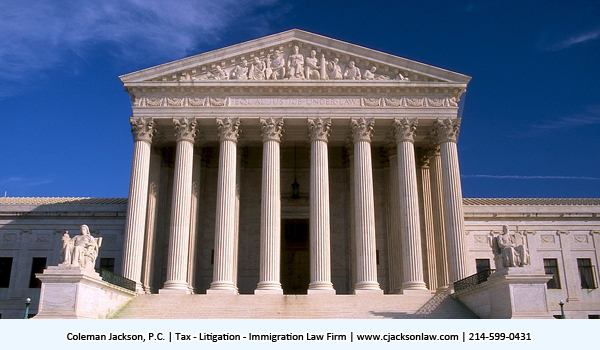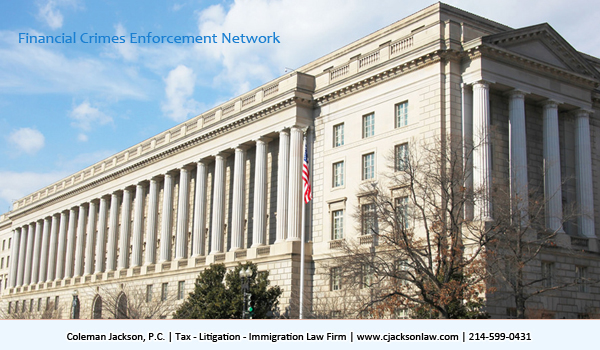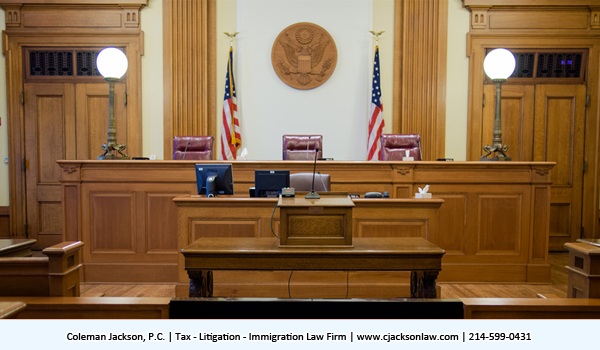By Coleman Jackson, Attorney, CPA
October 20, 2017
Under United States law an annual reporting and disclosure responsibility is placed on any United States person with any financial interest in or signatory authority over, a bank, brokerage, stock, or any other financial account in a foreign country. See 31 U.S.C. Sec. 5314(a) and regulation 31 C.F.R. Sec. 1010.350(a). The Bank Secrecy Act (“BSA”), U.S.C. Sec. 5311, et seq., requires U.S. persons to keep records and file reports with respect to their foreign bank account holdings. United States Person is defined in the statute and regulations as U.S. citizens, resident aliens, trusts, estates, and domestic entities that have an interest in foreign financial accounts and meet the reporting threshold under the statute. The reporting threshold is bank account(s) with balances of $10,000 at any time during the calendar year in either one financial account or any combination of financial accounts. U.S. citizens and lawful permanent residents of the United States are included in the definition of U.S. persons regardless of where they actually reside in the world, so long as, their U.S. citizenship has not been forfeited, or LPR’s Green Card status has not been administratively or judicially revoked or abandoned. Moreover, resident aliens of U.S. territories and U.S. territory entities are also subject to FBAR reporting.
Currently the FBAR is filed on Form 114 each April 15th with the Financial Crimes Enforcement Network. The civil penalties vary depending upon whether the U.S. person who failed to timely file Form 114 acted in a non-willful manner or whether they acted in a willful manner. Non-willful violations of the FBAR filing requirements result in a maximum penalty of $10,000. However, the penalty for willfully violating the FBAR reporting requirements can result in a civil penalty of the greater of $100,000 or fifty percent of the highest balance in the account at the time of the violation. See 31 U.S.C. Sec. 5321(a) for a full discussion of permitted penalties that can be exacted on U.S. persons who violate the FBAR reporting requirements. The U.S. Congress has written the FBAR statutes in such a way, well the best way to describe it is like this—strict liability. In the case of willful violation; upon conviction it is strict liability for sure because there is no reasonable cause defense available to a taxpayer who willfully violates the FBAR disclosure requirements. But as we disclose later in this blog, facts and circumstances matter in willful failure to file cases. But as for the non-willful cases, let’s make clear right now: Reasonable Cause is a possible defense for non-willful violations of the FBAR statutes. If the U.S. person did not fail to file or the failure to timely file was attributable to a reasonable cause (such as reliance on accountants or professional tax preparers or other credible reasons), there should not be an FBAR penalty and any attempts by the IRS to collect a penalty would be a violation of the statute. See White Mountain Apache Tribe, 537 U.S. 465, 477 (2003) and 31 U.S.C. Sec. 5321(a)(5)(B)(ii)(I).
In this blog, we will focus on the alleged willful violation of the FBAR reporting requirements. First the taxpayer need to remain silent because the Courts have said the burden of proof is on the Internal Revenue Service to prove that the taxpayer willfully violated the FBAR reporting requirements. MAKE NO ADMISSONS that you had the requisite intent to violate the law. An admission to an IRS examiner, agent or officer will be difficult to overcome even with the most skillful legal team. So the best thing is to remain silent, seek legal counsel and fully cooperate with the IRS. That does not include making uninformed admissions. The law governing FBAR (when is actions non-willful, inadvertent as opposed to willful) is complex and what the taxpayer may think is an honest statement or rendition of facts, may not be the whole truth and nothing but the truth. It is hard and perhaps impossible to unravel half-truths, errors, misunderstandings or outright lies without unintended legal consequences. Lies tumble into more lies and unless the taxpayer is into gymnastics, its best to leave the tumbling to the experts.
What is willful behavior in federal tax law? Willful conduct is clearly something more than negligence or inadvertent actions. The United States Supreme Court stated over ten years ago that “where willfulness is a statutory condition of civil liability, it is generally taken to cover not only knowing violations of a standard, but reckless ones as well.” The U.S. Supreme Court case of Safeco Ins. Co. of Am. v Burr, 551 U.S. 47, 57 (2007) controls what the IRS must prove if they hope to prevail in a civil ‘willful violation of the FBAR reporting requirements case’. Note that negligence or inadvertent actions are not included in the U.S. Supreme Court’s ‘willful’ definition. Negligent and inadvertent failure to comply with the FBAR reporting requirements are classified as ‘non-willful violations’; and in those cases the offending U.S. person should raise all reasonable cause defenses that might be plausible under the circumstances. The taxpayer should not pay any more penalty than they lawfully owe after considering all the facts and circumstances. Beware: repetitive violations of the FBAR reporting requirements could possibly be construed as ‘willful behavior’. Multiple inadvertent errors may not pass the smell test—this reckless behavior could be the stench of willful snubbing the tax system, and could very likely lead to a ‘willful violation’ charge and even possibly a tax evasion charge. If those are the facts and circumstances, a reasonable cause defense is seriously jeopardized. Recklessness is but a few steps from intentional. The more education U.S. persons have regarding the things discussed in this blog; the closer on the ‘decision continuum’ they come to ‘recklessness and intentional’ when their subsequent behavior doesn’t conform to their level of knowledge. Good moral character matters in tax law- and everywhere else in a civil society.
The best way to look at this is in what I refer to as a “decision continuum “; in the case of ‘failure to timely comply with the FBAR reporting requirements’ that decision continuum – goes from negligence to one or more inadvertent actions on to many more inadvertent actions to intentional actions resulting in failure to comply with the FBAR reporting requirements. The proper civil penalty, if any, depends upon the U.S. person’s culpability in failing to comply with the law. The actual penalty paid could range from zero dollars in the case of a successful reasonable cause defense in a non-willful violation case to millions or more dollars in high dollar foreign bank accounts with willful violation of the FBAR reporting requirements. A penalty based on a percentage of the foreign bank account balance can become enormous quickly! In reality the FBAR penalties coupled with other tax penalties and interest could erase a taxpayers’ wealth and upon conviction take away their liberty. Taxpayers should never concede anything in these cases because the monetary exposure can be extremely high! There are also potential criminal exposures for FBAR violations; we have written about criminal exposures resulting from FBAR violations in one or more of our previous blogs; the standards of proof and burdens in criminal matters are different than in those civil cases. We will skip that discussion here. Best initial strategy in FBAR cases is silence until the U.S. person and their legal team can figure out what they are dealing with and develop the ideal legal strategy under the circumstances.
If the IRS attempts to impose the ‘willful violation penalty’ which is the greater of $100,000 or fifty percent of the account balance at the time of the violation, remember; in a civil penalty case the government must prove your actions were ‘willful’. They must prove by a preponderance of the evidence (more likely than not) that you willfully did something other than sign your tax return. Nor does checking the box “NO” concerning foreign bank accounts on the tax return constitutes prima facie evidence of ‘willful intent to violate the FBAR reporting requirements’. Often in the past the IRS has made these arguments about the signature and the checked boxes on the taxpayer’s tax return. But Courts have repetitively stated that “a taxpayer’s signature on a return does not in itself prove his knowledge of the contents”. A competent court will examine all the facts and circumstances then apply the applicable laws which mean that there is room for argument and putting forward a vigorous defense. In a case United States v Mohney, 949 F.2d 1397 (6th Cir. 1991), the Court describes the nuance that courts goes through when analyzing these types of tax cases. By the way, these cases can be tried in federal district court, federal claims court or in the U.S. Tax Court. Cases can be tried in the tax court without first paying the penalty; however, in the district courts or federal claims court, taxpayer’s must first pay the civil FBAR penalty and any other related tax penalties and interest.
An FBAR penalty case decided in April 2017 in the United States District Court for the Eastern District of Pennsylvania ( Case 2:15-cv-05853-MMB, Arthur Bedrosian v The United States of America, Department of the Treasury, Internal Revenue Service) should give taxpayer’s struggling through IRS allegations of willful violation of FBAR reporting requirements heart. In Bedrosian case, the taxpayer won against the U.S. government’s willful failure to file FBAR allegation in court! Taxpayers can win willful failure to file FBAR cases in court! As reported by the Court in the Bedrosian case, Bedrosian, a Chief Executive Officer in the pharmaceutical industry was a United States citizen who had two foreign bank accounts. For years on the advice of his accountants, he failed to disclose these accounts on his tax return and he did not file the required FBAR reports for either account although the reporting threshold of $10,000 was met in those years. In 2007 after going to another accountant for his tax work, he was advised that he had FBAR filing issues. He disclosed one of the accounts but not the other in his 2007 FBAR filings. To be brief: the IRS sent him a letter on July 18, 2013 stating that it was imposing a penalty for his willful failure to file TDF 90.22.1. The FBAR reporting Form in 2007 was Form TDF 90.22.1; it is now Form 114. Anyway, the IRS proposed to access a penalty of $975,789.17 which was 50% of the maximum value of the account ($1,951,578.34) which is the largest permitted penalty under the statute. Bedrosian filed suit in federal district court in October 27, 2015. The thing to note in the Bedrosian case is that the Court said facts matter in willful failure to file FBAR cases! The government must prove Bedrosian willfully failed to submit an accurate FBAR report in 2007; Bedrosian’s knowledge concerning his FBAR reporting requirements are relevant facts, and his relationship with his accountants are also relevant facts; even though, there are no reasonable cause defense in ‘willful failing to file FBAR cases’. FACTS MATTER! TAXPAYERS CAN WIN WILLFUL FAILURE TO FILE FBAR CASES IN COURT! The point of this case is U.S. persons may have hope in court in willful failure to file FBAR cases because the IRS must prove that the taxpayer willfully violated the FBAR statute. This is true even though ‘a reasonable cause’ exception only exist for non-willful violations as shown in 31 U.S.C. Sec. 5321(a)(5(C)(ii). Intent to violate the statute or reckless disregard of the disclosure requirements (don’t give a hoot attitude) must be proved; what someone’s intent is can be proven by direct evidence; such as an admission against interest, credible witness testimony, contemporaneous letters or documents; but most likely, the courts will decide these type of cases on all the facts and circumstances. The government must prove that the taxpayer violated the statue willfully, which has been defined by the U.S. Supreme Court and subsequent courts as ‘knowing intent or reckless behavior’. If the facts are on the U.S. person’s side, taxpayers can win willful failure to file FBAR cases in court.
This law blog is written by the Taxation | Litigation | Immigration Law Firm of Coleman Jackson, P.C. for educational purposes; it does not create an attorney-client relationship between this law firm and its reader. You should consult with legal counsel in your geographical area with respect to any legal issues impacting you, your family or business.
Coleman Jackson, P.C. | Taxation, Litigation, Immigration Law Firm | English (214) 599-0431 | Spanish (214) 599-0432







